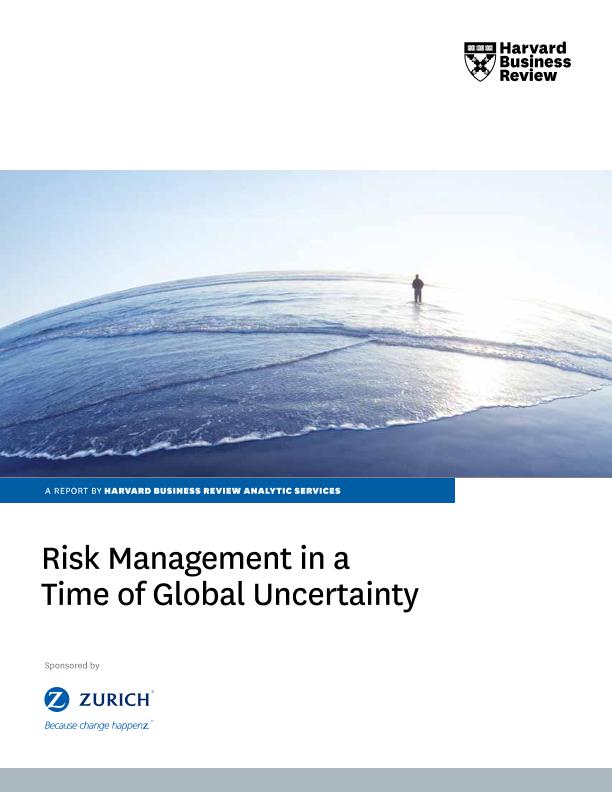Risk management in a time of global uncertainty

Contenido multimedia no disponible por derechos de autor o por acceso restringido. Contacte con la institución para más información.
| Tag | 1 | 2 | Valor |
|---|---|---|---|
| LDR | 00000nam a22000004b 4500 | ||
| 001 | MAP20120001213 | ||
| 003 | MAP | ||
| 005 | 20220912094109.0 | ||
| 008 | 120118s2012 che|||| ||| ||eng d | ||
| 040 | $aMAP$bspa | ||
| 084 | $a7 | ||
| 245 | 0 | 0 | $aRisk management in a time of global uncertainty$ca report by Harvard Business Review Analytic Services |
| 260 | $aZurich$bZurich Financial Services Group$c2012 | ||
| 520 | $aAlready on the upswing in many industries, the focus on enterprise-wide risk management has entered a more intense phase across a broad range of global companies since the 2008 financial crisis and recession. In a survey by Harvard Business Review Analytic Services, over two-thirds of 1,419 business executives said risk management has become somewhat or significantly more important over the past three years. Most executives still feel their companies have a long way to go, however, in building an effective, riskaware culture. The Harvard Business Review Analytic Services study, which was sponsored by Zurich Financial Services Group, found that only 1 in 10 respondents said their executive management was highly effective at creating a strong risk-aware culture. And only 40% of respondents considered their approach to enterprise risk management (ERM) to be proactive, with an integrated process that involves the board and business and functional leaders at all levels of the organization. Over the past decade, and increasingly since the financial crisis, companies in many industries are either instituting ERM processes for the first time or improving existing processes. Today, for example, 42% of companies with 10,000 or more employees report that they have a chief risk officer, compared with only 11% three years ago. Yet companies with best practices in ERM continue to be concentrated in a few sectors that have traditionally been strong in this area: financial services, health care, and energy. By contrast, barely one-third of all respondents felt they were doing well at any of the six risk management capabilities they most often cited as critical to organizational performance | ||
| 650 | 1 | $0MAPA20080591182$aGerencia de riesgos | |
| 650 | 1 | $0MAPA20080579814$aCrisis financiera | |
| 650 | 1 | $0MAPA20080569815$aOrganizaciones | |
| 650 | 1 | $0MAPA20080536534$aERM | |
| 650 | 1 | $0MAPA20080550592$aEncuestas | |
| 650 | 1 | $0MAPA20080597870$aOrganización interna | |
| 650 | 1 | $0MAPA20080628529$aProgramas de gerencia de riesgos | |
| 710 | 2 | $0MAPA20120004313$aHarvard Business Review Analytic Services | |
| 710 | 2 | $0MAPA20090032873$aZurich Financial Services Group |

